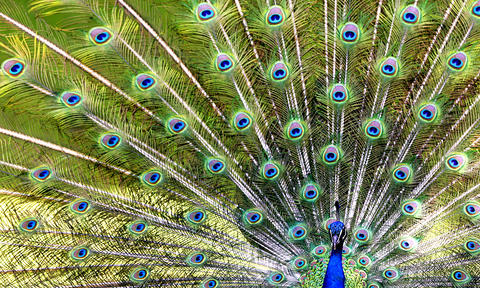A peacock in a fast-food restaurant parking lot was attacked by a man who said the bird was a vampire.
The bird was put down, said Richard Gentles from New York City's Center for Animal Care and Control.
The peacock, a male several years old, sat on a car in a Burger King parking lot on the morning of May 28. Workers had been feeding him bread when the man showed up.

Photo: AFP
He took the bird by the neck, threw it to the ground and started kicking and stomping on the peacock, said worker Felicia Finnegan, 19.
"He was going crazy," she said.
Asked what he was doing, she said, the attacker explained, "I'm killing a vampire."
Workers called the police, but the man ran away.
Authorities were looking for the attacker, a young man.
It was not clear how the bird got to Burger King, but a person who lives near the restaurant was given one.
一隻在速食餐廳停車場逗留的孔雀遭到一名男子攻擊。男子指稱這隻孔雀是吸血鬼。
紐約市立動物管制局的理查.捷特斯說,孔雀已被安樂死。
這隻已好幾歲的公孔雀,五月二十八日早上坐在漢堡王停車場的一輛汽車上。那名男子出現時,幾名漢堡王員工正在餵牠吃麵包。
十九歲的員工費莉西亞.費妮岡說,男子掐住孔雀脖子,把牠摔向地板,再開始用力踢踩。
她說︰「他簡直瘋了。」
她說,男子被問及在做什麼時說︰「我在殺吸血鬼。」
幾名員工報了警,但男子已逃逸無蹤。
警方正在尋找這名年輕的男攻擊犯。
目前尚不清楚孔雀是怎麼到漢堡王來的,但附近有位居民曾獲贈過一隻孔雀。
(美聯社/翻譯︰賴美君)

Have you ever gazed at the night sky and felt as though the Moon loomed larger than usual? Your eyes were not deceiving you. The Moon’s apparent size can __1__ subtly depending on where it is in its orbit. On certain occasions, it reaches its fullest phase while at its closest point to Earth. When these two events __2__, scientists and the public refer to the spectacle as a “supermoon.” The Moon does not orbit our planet in a perfect circle. Instead, it travels along a more oval-shaped __3__, completing one full orbit every 27 days. Consequently, there are times when

A: South Korea’s Golden Disc Awards ceremony is taking place at the Taipei Dome on Saturday. Eighteen acts are taking to the stage, including Blackpink’s Jennie. B: The hottest boy group CORTIS is also performing. I can’t wait to see James, the Taiwanese member of the band, perform. A: Who else are playing at the K-pop show? B: This year’s lineup is stacked, including: Allday Project, ARrC, Ateez, Boynextdoor, Close Your Eyes, Enhypen, IVE, Izna, KiiiKiii, Le Sserafim, Monsta X, NCT Wish, Stray Kids, TWS, Zerobaseone and Zozazz. A: SKZ, Enhypen and Ateez dominated Billboard’s 2025 Year-End World

A: Aside from K-pop, what were the English chart-toppers? B: Billboard’s top three singles for 2025 were “Die with a Smile” by Lady Gaga/Bruno Mars, “Luther” by Kendrick Lamar/SZA and “A Bar Song (Tipsy)” by Shaboozey. Plus, pop diva Mariah Carey’s 1994 megahit “All I Want for Christmas Is You” won its 20th and 21st weeks at No. 1, becoming the longest-running No. 1 song in history, A: How about in Taiwan? The news says nine of the 10 most-streamed songs on Spotify Taiwan were Korean. B: Yup, and the top three were: “Winter Ahead” by BTS’ V and Park

AI-generated summaries are shaking up the media world. Tools like Google’s AI Overviews now provide users with direct answers above the search results, resulting in fewer people clicking on news links. For publishers who rely on that traffic to generate advertising revenue, this shift is hitting hard. The fallout is measurable. Many sites have seen a sharp drop in traffic since AI summary features rolled out. An analysis revealed that a news outlet that had once ranked first on Google lost up to 79% of its traffic when its link appeared beneath an AI-generated summary. Statistics also show that